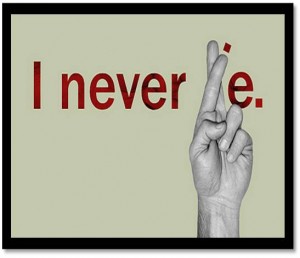 Hi! I’m a perfect-scoring SAT tutor and you should join my mailing list so I can send you free subscriber-only tips and downloads to help your score!
Hi! I’m a perfect-scoring SAT tutor and you should join my mailing list so I can send you free subscriber-only tips and downloads to help your score!
Can you believe this?!
Did you know that you can flat-out lie when you’re writing your SAT essay?
(Right now you’re thinking… “What does he mean, lie… like I can just make stuff up?”
Yes, that’s exactly what I mean.
When you need evidence for your SAT essay, you can just make up lies to use that will prove your point and fill up your body paragraphs.
But first you might be wondering if you can take this strategy seriously – if you can actually trust me.
Allow me to convince you that this is an amazing source of power for your SAT essay writing, starting with the reasons it cannot hurt you, and continuing on to some exact strategies about how to use it:
Your lies will not cost you points, and here’s how you can be sure of it:
There are four different reasons that, as a professional SAT prep tutor, I feel 100% certain in my claim that you can make up lies as evidence on the SAT essay.
Get Exclusive SAT Prep Tips!
I want to send you more tips to help your SAT score, but I need your email address to stay in touch. Enter your email below so I can send you my reports on the SAT and other subscriber-only bonuses.
1: The standardized-test logic of the SAT:
The whole point of the SAT is that it’s a “standardized” test. That means it’s supposed to give the same scores regardless of when or where it is taken. Colleges and scholarships need this standardization in order to compare students from different high schools in different cities, states, or even countries from around the world.
Now, the problem is, the SAT essay is the only part of the test that is graded by humans. If the movie Terminator 2 taught me anything at all, it’s that humans are difficult to standardize.
The College Board needs its essay graders to act like ScanTron Robo-Graders, but unfortunately, they are humans, and they come from different academic backgrounds.
Here are a few types of people that might wind up as SAT essay graders:
- A high school music teacher
- A college history professor
- A middle school soccer coach
- A laid-off New York Times writer
- A medical student in training
All of these folks will have different specializations, and they would all catch different factual errors in your essay.
The music teacher might say, “Hmm… I know that Beethoven was born in 1770, not 1827.”
The soccer coach might say “Hmm… I know that soccer balls are made of synthetic leather, not plastic.”
Therefore, to keep this standardized test standard, they ignore “factual errors” (otherwise known as “lies”) in students’ writing and focus on things like staying on topic and providing a convincing, well-supported and well-structured argument with some strong vocabulary.
I’ve asked an SAT Essay grader myself:
More accurately, I saw the grader answering questions in an online forum.
This grader remained anonymous but answered any and all questions that he or she was asked.
One of those questions was about taking off points for getting facts wrong, and the grader replied that no points were ever deducted, according to the official grading manual.
I’ve seen the quote from the actual training manual for graders:
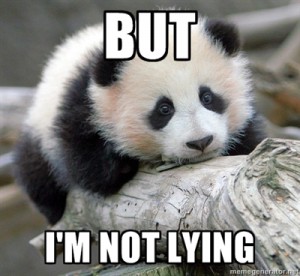 Some time after reading the “Ask Me Anything” grader forum posts, I found an actual page from the grading manual that someone was quoting – although I can’t remember the exact wording.
Some time after reading the “Ask Me Anything” grader forum posts, I found an actual page from the grading manual that someone was quoting – although I can’t remember the exact wording.
It definitely confirmed that lies, incorrect “facts,” and inaccuracies in your evidence are NOT deductible, as confirmed above.
The final test: I’ve tried it myself in real life:
Well. It’s all just theory until you actually try it out.
Being the committed pro that I am – ehehehe – I actually tried this out in real life, on an official SAT.
I lied, made up stories, books, historical figures, and got all the facts about Gandhi wrong.
It didn’t matter. In the end, I got a 12 out of 12.
As suspected, YOU CAN LIE ON THE SAT ESSAY SECTION.
So, here’s why you might want to lie and make up evidence on your SAT essay:
In no particular order, here are some reasons that contribute to why you might choose to lie or make up evidence for the SAT essay.
Believe it or not, I’m completely serious right now. This is a pro-tutor’s essay strategy that I would official use and recommend using to anyone who likes the idea.
Making up evidence or lying can help solve ALL of the following difficulties:
1: You don’t have much time to write the SAT essay:
You only are given 25 minutes to write the entire essay. A lot of that can be spent (“wasted”) trying to think of examples to write about that will actually fit the prompt. This is super-easy to deal with, though, if you just make up a book or historical figure that supports your argument.
2: It’s hard to think seriously because it’s early and you’re stressed:
Even if you’re a morning person, you’ll be stressed because it’s the SAT. Many students will find it less stressful if they just plan to make up evidence as they go, as long as they’ve tried this out in practice a few times to reassure themselves that they can do it properly.
3: The essay prompt is random:
Here’s a great reason for you to make things up for your SAT essay. The prompt is somewhat random – so it’s not necessarily easy to prepare your evidence. But, if you’re planning to just make up a story anyway, then it hardly matters what the prompt is, and you don’t need to plan your evidence out.
4: It’s critical that you stay on-topic in the SAT essay:
You might occasionally let your body paragraphs wander off topic as you get deeper and deeper into your argument. That’s only human – you’re trying to fit someone or something that actually happened into a theoretical argument. This will always involve some difficulties making the connection and that may be why you find yourself going off-topic. Reality just doesn’t conform perfectly to SAT essay prompts.
5: You need maximum power from each evidence example
Because you’re so, so limited by time and space, each of your supporting examples needs to be utterly amazing to get a great score. If you can tailor-fit each of your examples by lying and making them up to fit your thesis perfectly, then you’re sure to receive a great score on the essay.
At the very least you should be aware of the “lying option” and the reasons it exists:
Whether you use it or not, the lying option is a powerful trick to keep in your pocket for the SAT essay.
It can help with panic situations, difficult prompts, or a lack of time to prepare for the SAT.
Here’s a parting thought.
It’s one way that my SAT-prep style of thought is different than certain other companies’.
Many tutors will mention the fact that you can lie on the SAT essay. This is not some huge secret, although most students aren’t necessarily aware of it at first.
BUT – and this is big – most tutors act like this isn’t a big deal. Like, they mention it as an afterthought – “Oh hey, don’t worry if you’re not quite sure about what year Abe Lincoln was born, just take a guess.”
SURE, that’s a nice tip. But to my way of thinking, isn’t this the only essay you’re ever written for a grade where you could just lie and it wouldn’t matter at all?
I think it’s a much bigger, more fascinating fact than everyone else does.
I think that maybe, just maybe, our SAT essay-writing strategies could revolve around this fact.
Hope this provokes some thoughts, and leave a comment if you have any suggestions or questions…
By the way, if you don’t want to make evidence up on the fly, study my e-book Top 30 Examples to Use as SAT Essay Evidence!
Further Reading:
What is the SAT Essay about?
The Liar’s Perfect-Score SAT Essay Template
Secrets of the SAT Essay Prompts
Top 5 Historical Examples for the SAT Essay
How to Get a Perfect Score on the SAT
Additional Resources:
Top 30 Examples to Use as SAT Essay Evidence (e-Book)
Write the Best SAT Essay of Your Life (e-Book)
Conquer SAT Vocabulary (Video Course)
Wait!! Don’t forget to join for my FREE SAT mailing list before you leave today so I can send you more exclusive content to help your score!


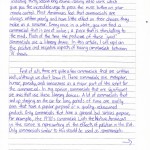

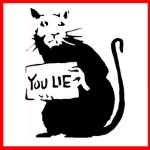

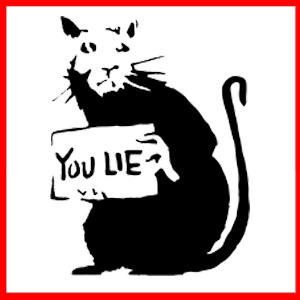


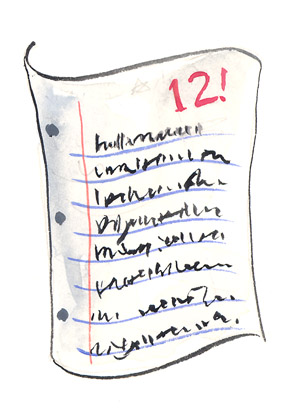








Find Me on Social Media